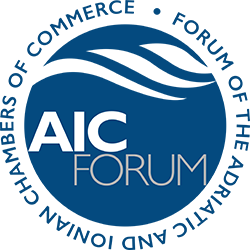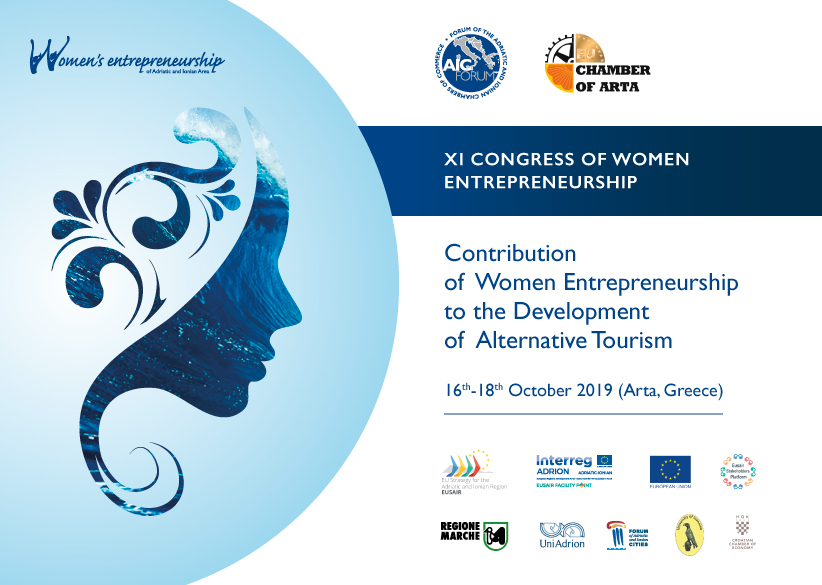The 11th Congress of Women’s Entrepreneurship of Adriatic and Ionian Area was held on the 16th-18th of October for the first time in Greece, in the city of Arta. The event, jointly organized by the Forum AIC and the Arta Chamber of Commerce in collaboration with Ioannina University and Split Chamber of the Economy is set within the wider context of the “Facility Point – Supporting the governance of the EUSAIR” project and has been organized with the support of Marche Region – Italian Project Partner. It focused on “ Women’s entrepreneurship contribution to the alternative and sustainable tourism in the AI Region” ” and saw the participation of more than 100 speakers, entrepreneurs, institutional representatives and stakeholders (all committed to the development of female entrepreneurship) from Italy, Greece, Croatia, Bosnia and Herzegovina, Montenegro, Albania .
This edition dealt with the Sustainable Tourism, addressing with in-depth analysis from national and international speakers issues related to innovation aspects of women’s entrepreneurship, alternative and potentially sustainable forms of tourism and related opportunities. Although tourism is already one of the fastest-growing economic activities in the Adriatic- Ionian Region the full potential of the Region is not yet exploited in a sustainable and responsible way (EUSAIR Action Plan, Pillar 4 – Topic 1 Diversified tourism offer). Congress provided not only the opportunity to share ideas and best practices but also to better respond to current challenges as well as on how to react to emerging sustainable tourism trends.
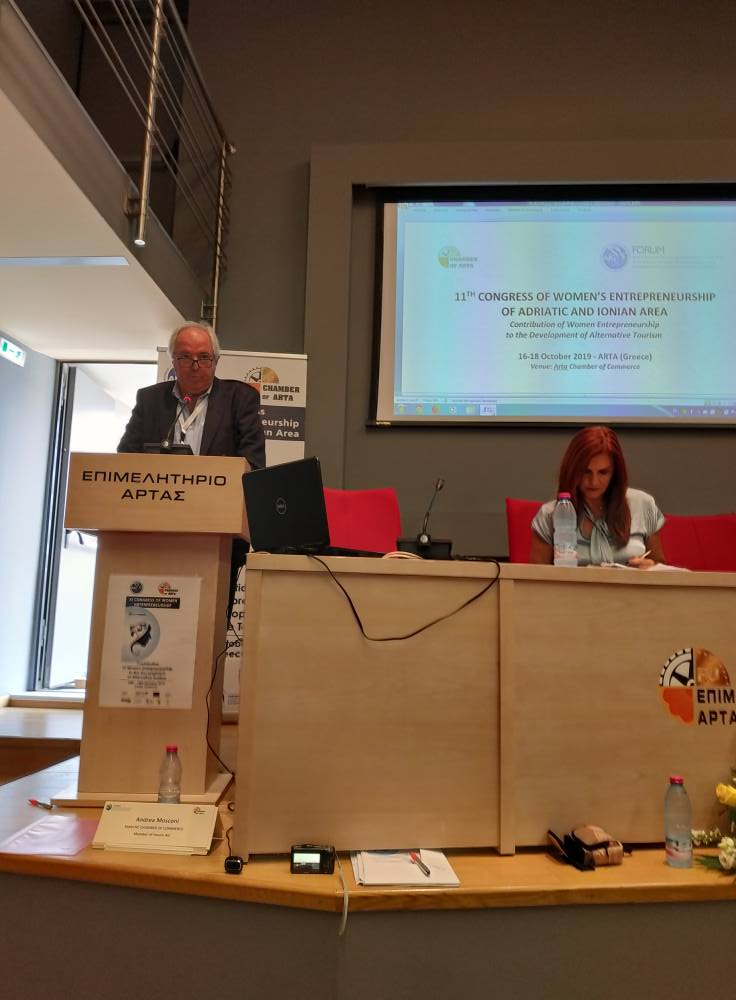 Moderating the debate, Voula Kehagia, journalist. On the 16th the plenary session opened with greetings of the President of the Arta Chamber of Commerce, Ioannis Gkolozomazos, who stressed the importance of the event: “An event that grows year after year, not only in terms of participation but also in content and results, and it has become a point of reference for both institutional and entrepreneurial comparisons within this geographical area”. The President of the Arta Chamber also underlined the need to support women entrepreneurship with the necessary tools, emphasizing the need for targeted programs and financial tools and incentives to enhance women’s entrepreneurship while providing management training, and financial management: “At the same time, national and local service structures need to be strengthened to allow family and professional life to be reconciled, to integrate entrepreneurship into education, to support women’s cooperatives in the context of a new national strategy for rural development. , and of course social economy activities, “he underlined. In closing, he stressed that boosting female entrepreneurship is vital to the future of both Greece and Europe. And it needs to be a horizontal targeting of state policies.
Moderating the debate, Voula Kehagia, journalist. On the 16th the plenary session opened with greetings of the President of the Arta Chamber of Commerce, Ioannis Gkolozomazos, who stressed the importance of the event: “An event that grows year after year, not only in terms of participation but also in content and results, and it has become a point of reference for both institutional and entrepreneurial comparisons within this geographical area”. The President of the Arta Chamber also underlined the need to support women entrepreneurship with the necessary tools, emphasizing the need for targeted programs and financial tools and incentives to enhance women’s entrepreneurship while providing management training, and financial management: “At the same time, national and local service structures need to be strengthened to allow family and professional life to be reconciled, to integrate entrepreneurship into education, to support women’s cooperatives in the context of a new national strategy for rural development. , and of course social economy activities, “he underlined. In closing, he stressed that boosting female entrepreneurship is vital to the future of both Greece and Europe. And it needs to be a horizontal targeting of state policies.
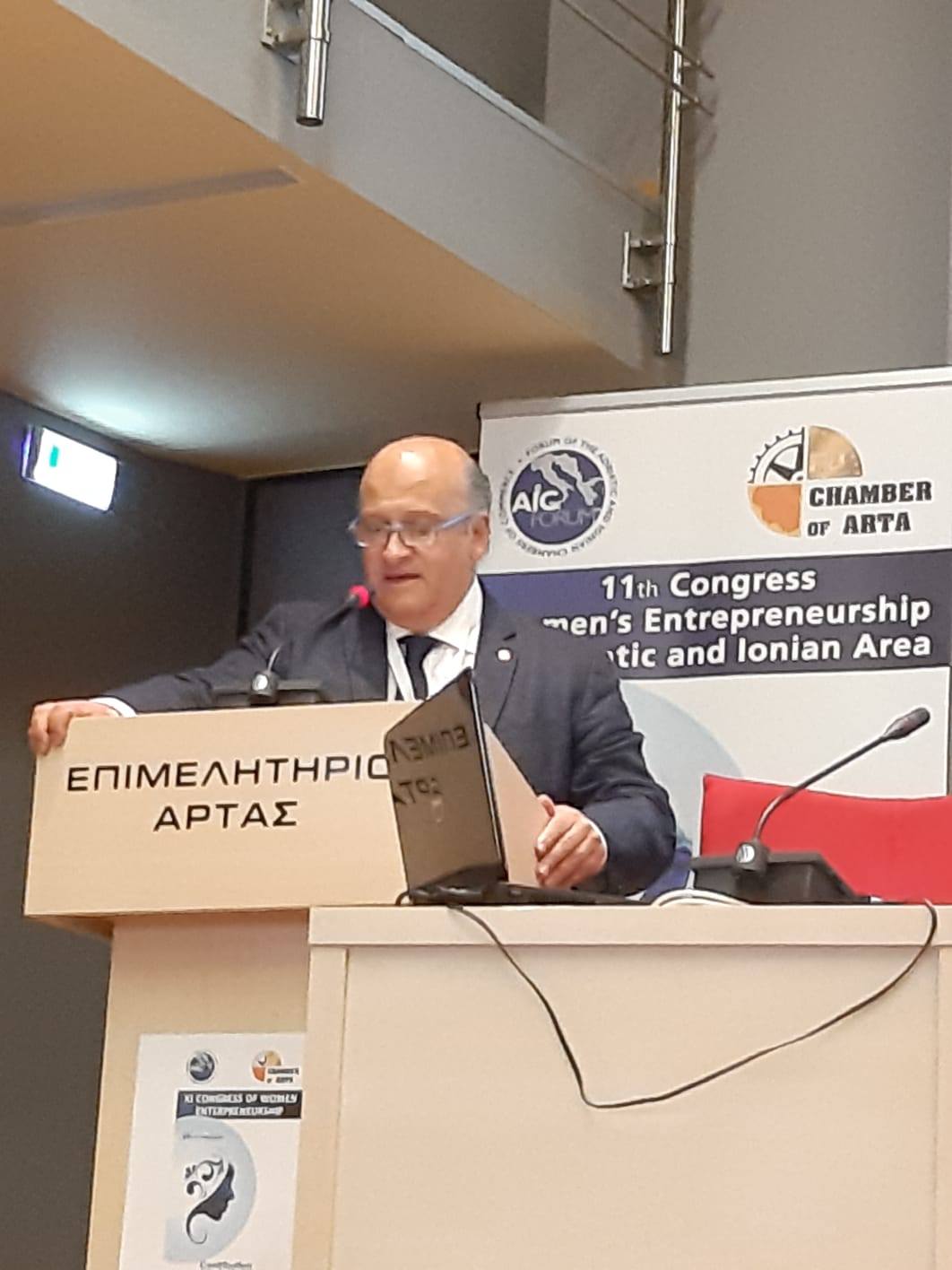 The President of the Forum of the Adriatic and Ionian Chambers of Commerce Gino Sabatini took the floor, highlighting the importance of the AIC Forum as a stakeholder of the EUSAIR strategy and the work that has been done over the years by the Women’s Entrepreneurship Workgroup since its establishment in 2006. Mr. Sabatini stressed the difficulties of finding homogeneous data on Women enterprises in the Adriatic and Ionian Area – which have been presented later during the plenary session by Speaker Mosconi – and invited the Chambers of Commerce in each Country, members of the Forum, to become interlocutors between National Static Center and Forum AIC in order to contribute year by year to have a more standard reading of such important data. Terezina Orlic, President of Croatian Chamber of Economy, County of Dubrovnik – on behalf of Split Chamber of Economy as coordinator of Forum AIC Women entrepreneurship workgroup – emphasized the differences and inequality still exists between men and women given the same level of results. Therefore, events like this one gain importance that add value to the significant contribution of female entrepreneurship to the market and society. She reaffirmed the importance of civil society, of the AIC Forum (together with the Forum of the Cities and Uniadrion) and emphasized that the macro-regional strategy is based on the principle of subsidiarity, thus linking the European dimension to local territories. The AIC Forum remains a key player to the Strategy today. This bottom-up approach, which starts and develops form civil society, is still lacking and invites the same civil society to participate through roundtables and governments to take greater account of them.
The President of the Forum of the Adriatic and Ionian Chambers of Commerce Gino Sabatini took the floor, highlighting the importance of the AIC Forum as a stakeholder of the EUSAIR strategy and the work that has been done over the years by the Women’s Entrepreneurship Workgroup since its establishment in 2006. Mr. Sabatini stressed the difficulties of finding homogeneous data on Women enterprises in the Adriatic and Ionian Area – which have been presented later during the plenary session by Speaker Mosconi – and invited the Chambers of Commerce in each Country, members of the Forum, to become interlocutors between National Static Center and Forum AIC in order to contribute year by year to have a more standard reading of such important data. Terezina Orlic, President of Croatian Chamber of Economy, County of Dubrovnik – on behalf of Split Chamber of Economy as coordinator of Forum AIC Women entrepreneurship workgroup – emphasized the differences and inequality still exists between men and women given the same level of results. Therefore, events like this one gain importance that add value to the significant contribution of female entrepreneurship to the market and society. She reaffirmed the importance of civil society, of the AIC Forum (together with the Forum of the Cities and Uniadrion) and emphasized that the macro-regional strategy is based on the principle of subsidiarity, thus linking the European dimension to local territories. The AIC Forum remains a key player to the Strategy today. This bottom-up approach, which starts and develops form civil society, is still lacking and invites the same civil society to participate through roundtables and governments to take greater account of them.
Greetings were addressed by The General Secretary of Commerce, Ministry of Development and Investments of Greece, Panagiotis Stampoulidi, Olga Gerovasili, Member of Parliament of Greece, Alexandros Kachrimanis, Head of the Region of Epirus, Greece, Christos Tsirogiannis, Mayor of Arta Triantafyllos Albanis, Rector of the University of Ioannina.
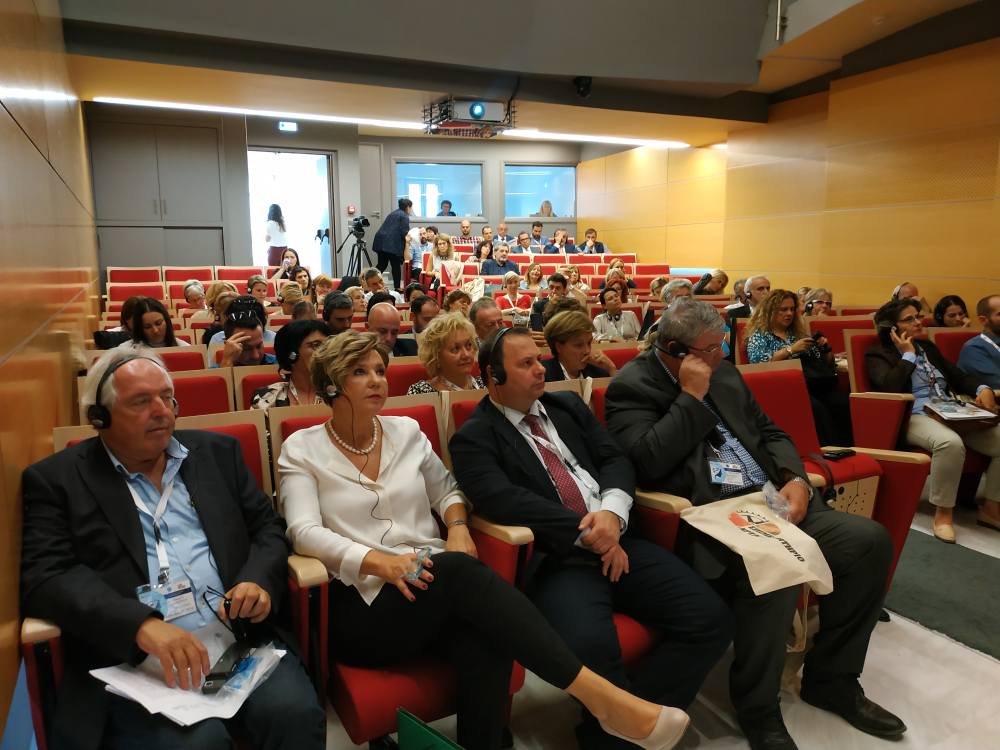
The first part of the plenary session “Current situation of female entrepreneurs in the EUSAIR Area” was opened by Argyro Karachaliou, Policy Officer, European Commission, DG Growth who presented an analysis on the Female Entrepreneurship across Europe, focusing on tourism as the asset of the future. She outlined the importance of the EEN network, which is one of the major tools of the Commission to support SMEs and at the same time women entrepreneurs because among the 7 workgroups there is one dedicated to the Female Entrepreneurship in which it seeks to promote concrete actions and support access to Eu funds. She mentioned the forthcoming event on November 6th in Belgrade where topics as access to credit, business angels and pitch business process will be addressed. Then she mentioned the EASME programme that has been set up by the European Commission to manage on its behalf several fields in terms of EMS support & innovation, environment, climate action , energy and maritime affairs, which, in 2020 foresees a project that will further connect public and private sectors not only with networking between EU networks but also through education and empowerment.
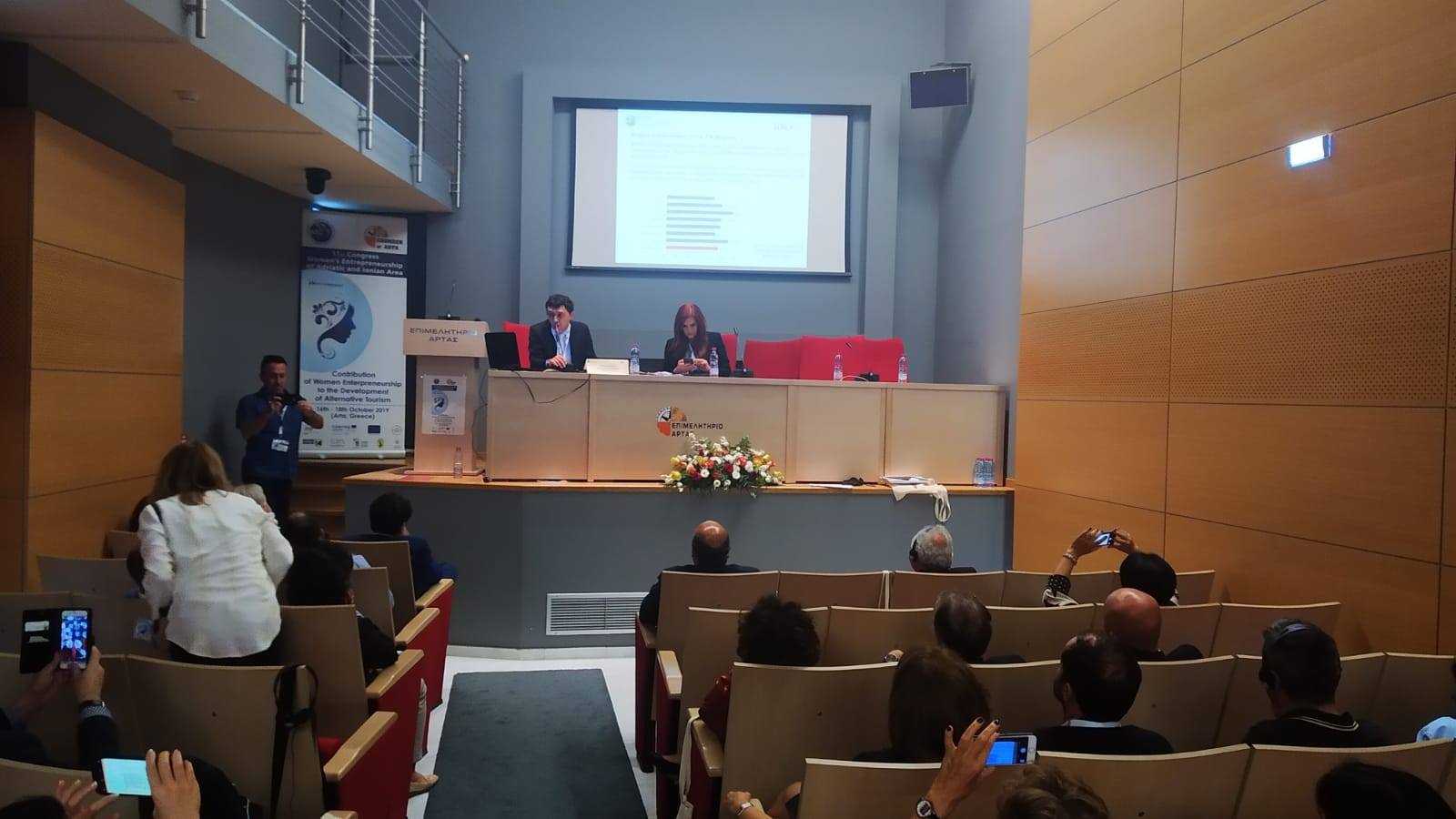 Andrea Mosconi, Marche Chamber of Commerce- member of Forum AIC, offered participants a general overview of the numbers of businesses led by Women in the EUSAIR area: Italy 22,6% of enterprises are owned by women (in the 7 Italian AI Regions), and statistics showed that the main sectors are Personal service Activities , Tourism, and health, and Social Activities and a share of 27,5% of newly registered entities in 2018 are led by women Greece: 30% according to the EU Commission statistics are female-owned enterprises; Croatia: 22% following the General overview of the Economic System; Quantity and quality of female presence in the Croatian economy system are different. Only 4,4% of income and 8,2% of employment are due to Female companies even if they represent 21,9% of register companies (same effect for male companies). Most of the women-owned businesses in Croatia are concentrated in the health sector, education and training; still lacking, however, it is the share of women in ICT and in the production sector. Before 2010, the number of WEs was below 10%; Montenegro: 24,3% of the business have female ownership, showing an increasing trend in terms of companies led by women, Monistat data about active businesses outline a lighter role of Women Companies in the local Economic system; Albania: 29,7% ,in particular increasing rates are shown within the service and trade Sector, although data from Albanian Business Register states a wider role of Women in business creation than World Bank (in terms of firms with female participation) Serbia: 33,4% according to the data provided by the Serbian Chamber of Commerce; Slovenia: 29% out of which 75% are sole entrepreneurs; Bosnia and Herzegovina: 27,3% of companies registered in the Republic of Srpska is owned by women, 29,1% considering those situations where women hold a minority share of the equity capital. Thanks to data provided by Uniadrion colleague from Marche Polytechnical of Marche it was also possible for Mr. Mosconi to analyze GEM Data (Global Entrepreneurial Monitor) which allows qualitative reading data providing a comprehensive set of indicators on entrepreneurship.
Andrea Mosconi, Marche Chamber of Commerce- member of Forum AIC, offered participants a general overview of the numbers of businesses led by Women in the EUSAIR area: Italy 22,6% of enterprises are owned by women (in the 7 Italian AI Regions), and statistics showed that the main sectors are Personal service Activities , Tourism, and health, and Social Activities and a share of 27,5% of newly registered entities in 2018 are led by women Greece: 30% according to the EU Commission statistics are female-owned enterprises; Croatia: 22% following the General overview of the Economic System; Quantity and quality of female presence in the Croatian economy system are different. Only 4,4% of income and 8,2% of employment are due to Female companies even if they represent 21,9% of register companies (same effect for male companies). Most of the women-owned businesses in Croatia are concentrated in the health sector, education and training; still lacking, however, it is the share of women in ICT and in the production sector. Before 2010, the number of WEs was below 10%; Montenegro: 24,3% of the business have female ownership, showing an increasing trend in terms of companies led by women, Monistat data about active businesses outline a lighter role of Women Companies in the local Economic system; Albania: 29,7% ,in particular increasing rates are shown within the service and trade Sector, although data from Albanian Business Register states a wider role of Women in business creation than World Bank (in terms of firms with female participation) Serbia: 33,4% according to the data provided by the Serbian Chamber of Commerce; Slovenia: 29% out of which 75% are sole entrepreneurs; Bosnia and Herzegovina: 27,3% of companies registered in the Republic of Srpska is owned by women, 29,1% considering those situations where women hold a minority share of the equity capital. Thanks to data provided by Uniadrion colleague from Marche Polytechnical of Marche it was also possible for Mr. Mosconi to analyze GEM Data (Global Entrepreneurial Monitor) which allows qualitative reading data providing a comprehensive set of indicators on entrepreneurship.
Sophia Kounenaki – Efraimoglou, President of the National Chamber Network of Women Entrepreneurs presented “ The women’s entrepreneurship as a synonym of Innovation and Development” illustrating case studies and best practices across the world regarding female entrepreneurship in the tourism sector.
The second session of the first-day event focused on “Education and Supporting tools for the development of Women Entrepreneurship and the presentation of the Stakeholder Platform as a clue tool for networking across institutions and stakeholders in the EUSAIR area.
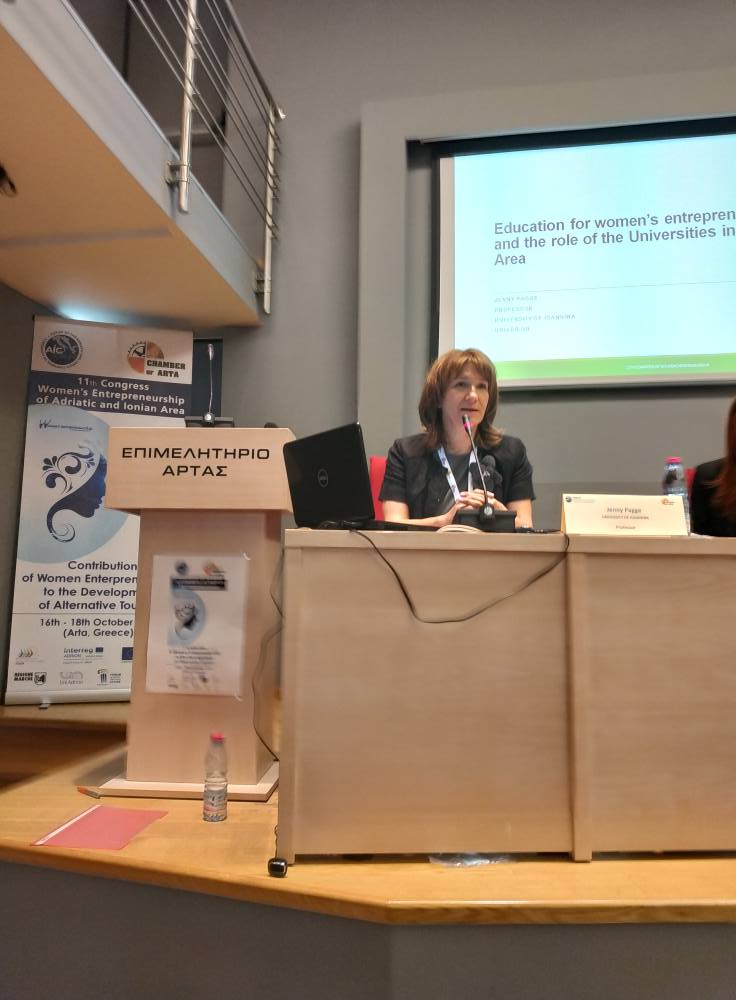
Jenny Pagge as representative of the University of Ioannina – coordinator of the Workgroup Women entrepreneurship for Uniadrion – stressed the role of the Universities in the EUSAIR area, and highlighted the importance of education in career management and how Universities Support Women Entrepreneurs in EEC. Regarding female Entrepreneurship is no doubt that there are some barriers: Education & Choice of Profession and nevertheless is necessary to keep mind the balance between family and work life. Mrs. Pagge presented the Entrepreneurship courses in Adriatic Ionian area: undergraduate curricula in Universities and some best practices of well-known Women entrepreneurs who graduated from Universities in the Ionian Adriatic region.
Stephen D’Alessandro (form distance – video) intervened on the situation of female entrepreneurship underlining the key challenges of general entrepreneurship, in particular, the soft skills development of self-confidence. Mr. D’Alessandro stated the importance of online training, modern online technologies, e-learning is the future of entrepreneurship competences development.
Yorgos Goletsis and Athanassia Mavrommati from the Department of Economics, University of Ioannina presented the best practice” The virtual incubator paradigm as a tool to leverage regional entrepreneurship in the Adriatic-Ionian Region, the YESS case and illustrated an overview regarding the start-ups in the AI region in 2019 which showed a significant increase in Serbia comparing with the data from 2018. They focused on the importance of online education tools as the Virtual business cross-border incubators make services available on the internet. They create a network, connecting companies with other companies, partners, customers, and suppliers. The functions of the virtual incubator are offered through the Internet, electronic data interchange, videoconference capabilities while Chrysostomos Stylios, Department of Informatic of Ioannina University focused on “The role of women in Quality Network for Sustainable tourism – Qnest, which has also been better presented during the Posters session scheduled on Friday 18.
Ioannis Vougiouokas, CEO of Epirus Bank In the framework of the section “Educational and Supporting Tools for the Development of Women’s Entrepreneurship”, delivered a lecture on “How Financial Tools and Services Can Boost Women’s Entrepreneurship” With this participation, Epirus Bank presented the specialized products developed as well as high-quality financing programs that can help any female entrepreneur to start her own business. “For us at Bank of Epirus, female entrepreneurship is today the demand. The entrepreneurial momentum and evolution of women in our region are a given. It is our primary goal and duty to stand by them and help them get started and develop their own business, “said Vougioukas, among others.
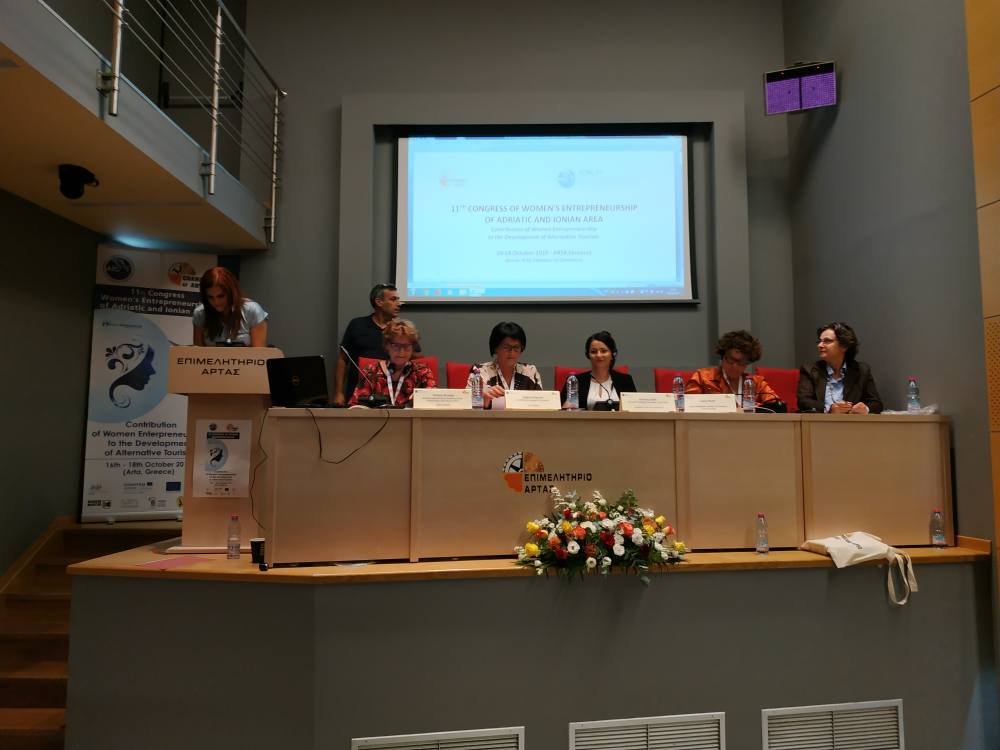
During the round table “Chambers of Commerce, services and supporting tools for Women Enterprise” the guests had to answer to two main questions related to the socio-economic framework of the women enterprises in their own country and the main sector of the activities the first; what the Chamber of Commerce have done/are doing and what can be done in order to better support the development of the women entrepreneurship.
Member of the Board of Directors of Greek Association of Women Entrepreneurs (EGE), Eleni Chrisikopoulou, spoke about the framework and sectors of female business, mentioning that in previous years the female industry was more referred to the manufacturing sector, today the situation is different: women entrepreneurs are more involved in service sector as they are the ones with more empathy. Furthermore, she mentioned that there has been an increase in the start-ups of young people and women entrepreneurs because there are subsidies and grants available from the government. As for the Greek Chambers of Commerce support, at the moment it doesn’t exist specific tools for the empowerment of women entrepreneurship, thus it would be useful to provide services like mentoring and at the same time to create in each Chamber a Sector group representing the Women Entrepreneurship interests.
Mrs. Lucia Pilutti, Secretary-General of Udine-Pordenone Chamber of Commerce illustrated the female role in business, stating that at the end of 2018 in Italy there were 1,165,000 active companies that defined themselves as female-owned, or with total or predominantly female ownership. This is 22.6% of active Italian companies, a share that basically does not change if we analyze the 7 Italian regions bordering the Adriatic (22.5%). The regions with a major presence of female enterprises are Molise and Basilicata where it is almost 30%), while at the opposite are Veneto (20.4%), Lombardy (19.3%) and Trentino Alto-Adige (18, 1%). Female presence is widespread in all sectors, even if with different quotas. Excluding the sectors where the number of active companies is not particularly significant, high percentages of women’s businesses are found in the personal services sector (including, in particular, laundries, hairdressers and beauty and wellness centers), where 55.5 % has female ownership; followed by health and social care services (residential and non-residential) with a share of 38.9%; tourist activities (both reception and catering) with 31.2%, education with 29.5%, administrative and support activities for businesses with 28%. In large sectors the weight of female enterprises is lower but still significant: in commerce it is equal to 23.7% (therefore slightly above the average of all sectors) and in manufacturing industry 17.6% (very low in construction, just 5.3%), while in the financial real estate sector it is around 20%. Mrs. Pilutti underlined the important contribution the Italian Chambers of Commerce provide to Women Entrepreneurship starting from Unioncamere (Union of the Italian Chambers of Commerce) that has been working for years to promote female entrepreneurship, as a fundamental component of the Italian entrepreneurship, and to promote entrepreneurial culture among women. It is for these purposes that it was promoted – starting from 1999 – the establishment of the Committees for female entrepreneurship at all the Italian Chambers of Commerce. The Committees are formed by women entrepreneurs identified by the business entrepreneurial Associations and by the Trade Unions engaged in the promotion of female entrepreneurship. She also mentioned the great importance given to Women Entrepreneurs in Friuli Venezia Giulia Region where the Chamber of Udine-Perdone, she represented is located. Following the incorporation of Udine and Pordenone Chambers of Commerce, new Committees for female entrepreneurship has been recently established and will start to work soon. Moreover, the Udine-Pordenone Chamber is part of the Sector Group of Female Entrepreneurs, within the Enterprise Europe Network (EEN), which aims at creating awareness and spreading awareness of European support programs and tools for the development of female entrepreneurship.
As far for Montenegro, the Vicepresident of the National Chamber of Economy, Ljiljana Filipovic mentioned that in the Country there is a good support system for the Female entrepreneurship sector, and the Chamber of Commerce itself has a Board of Women entrepreneurship which represent the interest of women entrepreneurs and the same National Chamber provides women’s businesses with mentoring and coaching; financial assistance and economic incentives; networking opportunities. in charge of providing financial and technical support for the women-led business.
Antonjia Basic, representative of Split Chamber of Economy and in charge of the coordination of the Workgroup on Women Entrepreneurship for Forum AIC, after reiterating the importance of women in the top management roles in Croatia, offered participants a general overview of the numbers of women’s businesses in Croatia. Since 2014, incentives have been provided which have enabled to increase the number of female entrepreneurs, thanks to banks and the government, thus influencing the share of women’s own holding companies. Most of the women-owned businesses in Croatia is concentrated in the health sector, education and training; still lacking, however, it is the share of women in ICT and in the production sector. Split Chamber of Economy, beside being the creator of the Workgroup on Women entrepreneurship in the Forum and of the Congresses, following some exchanges of best practices over the years, of has created an internal incubator for women enterprises and new business, thus strongly believe in the importance of the empowerment of women entrepreneurship in the territory.
Flutura Xhabija, President and CEO of SHGPAZ pointed out that the situation of female entrepreneurship in Albania should be more developed, there is difficulty in obtaining funding and even accessing European funds because the bureaucracy and difficulty in writing projects, she mentioned as well that there is not enough connection with universities and the society is dominated by a male environment. Her association has supported several SMEs led by women the Tirana Chamber of Commerce as well is developing various actions to support women’s businesses. At the moment in Albania, only the Chamber of Commerce of Tirana and Duress signed for the support of women’s businesses and much more could be done.
The first-day conclusion has been made by Donatella Romozzi from Marche Region, which is the Italian project partner of the project “Facility Point – Supporting the governance of the EUSAIR”. She presented the Macroregional Strategies processes focusing on EUSAIR. The Commission Communication on EUSAIR identifies the involvement of interested stakeholders – including civil society, academia, NGOs – as a key condition for good implementation of the Strategy. EUSAIR governance structures emphasized the importance of increased engagement of stakeholders in the coordination and implementation processes through consultative networks or platforms. To this, Facility Point project includes a specific WP – EUSAIR Stakeholder Platform (SP), lasting for the whole project duration (2016-2022) and conceived as a preferred tool to increase stakeholder engagement in EUSAIR Strategy coordination and implementation processes and support a two-way “vertical” communication between stakeholders and EUSAIR key implementers (Governing Board and Thematic Steering Groups) and vice-versa.
During our event, participants had the chance to learn more about the SP, and the possibility to register to the platform, technical support has been available during the 2 days. Moreover a dedicated group in the Sharing Channel of the Platform “Women Entrepreneurs in the Adriatic and Ionian Aerea” has been created which will allow to follow-up on the outputs of the workshops and presentations, as well as networking opportunities following the Congress.
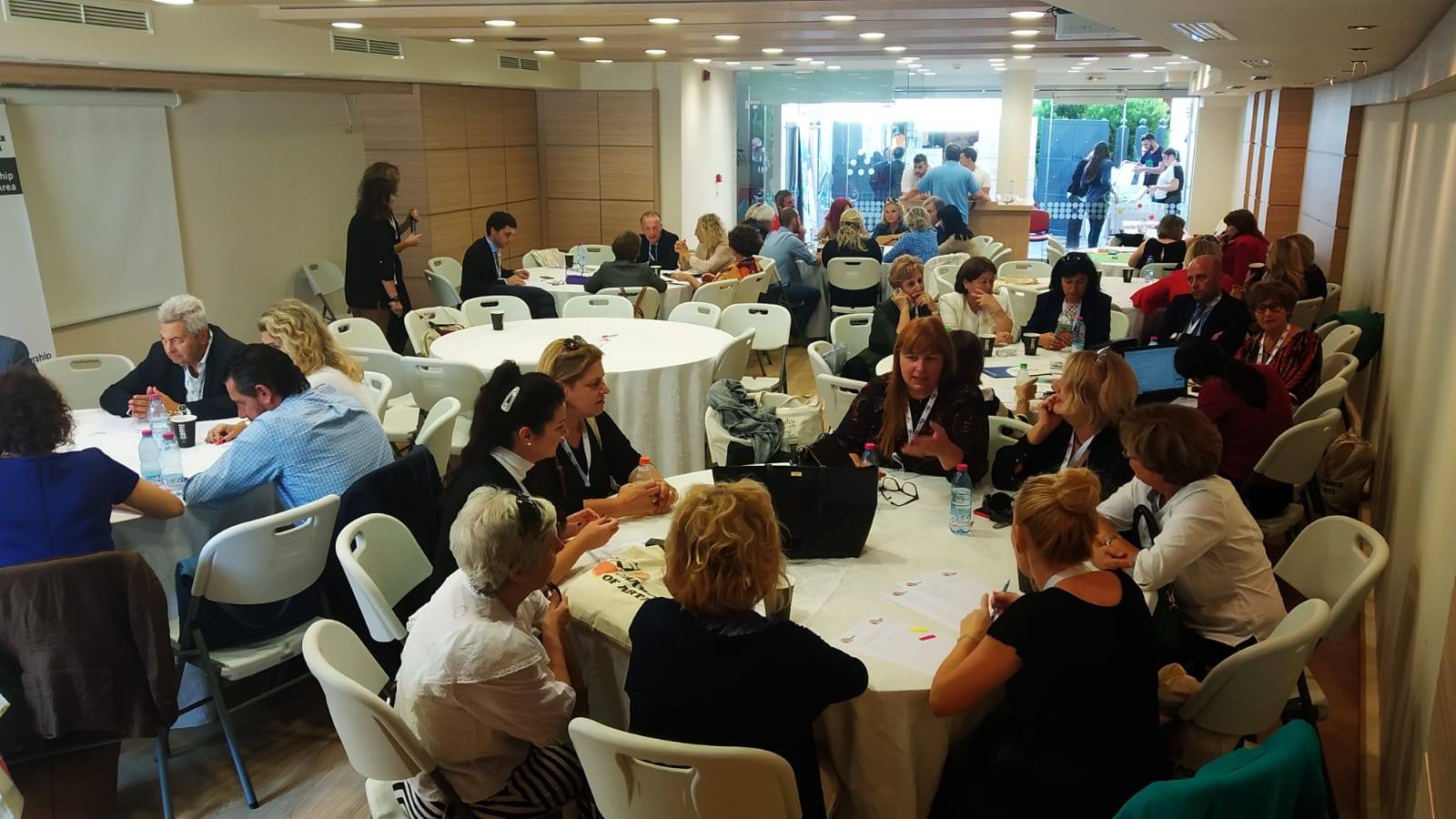
The second day was dedicated to the active involvement of the participants attending the congress, workshops and networking sessions allowed the sharing of best practices and the development of new partnerships and collaborations.
The first session of the second day “Focus on Alternative Tourism in the EUSAIR Region” saw the first presentation of the Rector of the University of Ioannina Professor Triantafyllos Albanis focused on the role and participation of universities in smart specialization programs and especially in the case of women’s entrepreneurship.”Systematic management of tourist destinations” was presented by Professor of Computer Science of University of Piraeus and President of ESCS Nikitas Asimakopoulos.
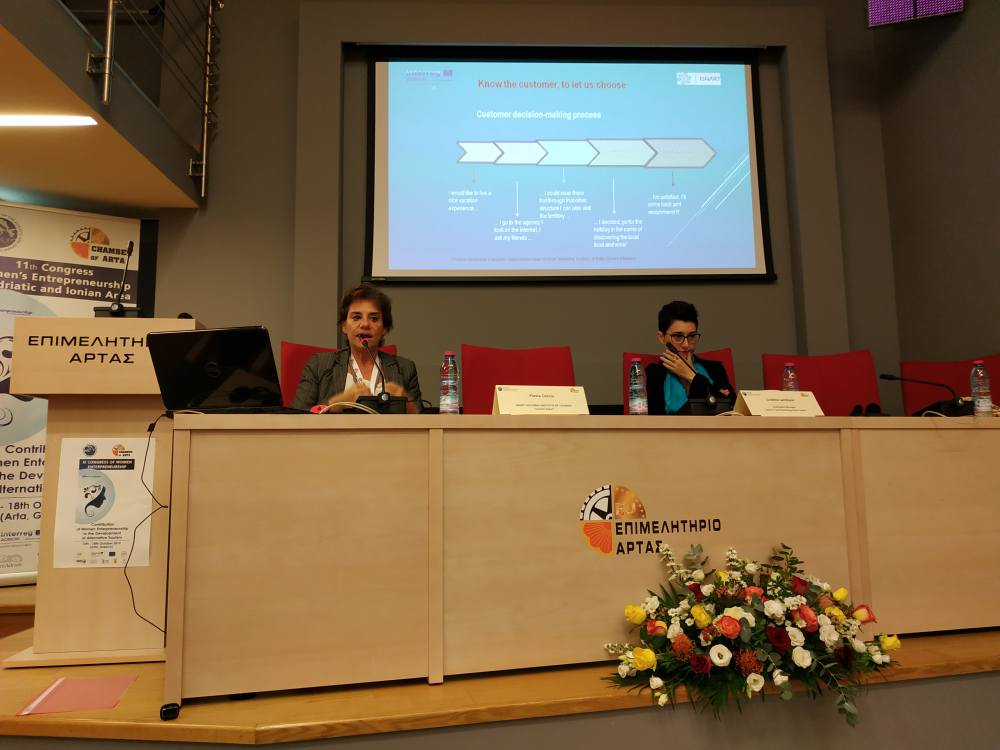 Tourism Specialist at the Association of Italian Chambers of Commerce and the National Institute for Tourism Research ISNART, Mrs. Flavia Coccia spoke on “Accessible and Alternative Tourism”, she shared her experience in the field of alternative tourism, the evolution of this sector over the years stressing the need to adapt to the market needs, from accessible tourism to accessible hospitality. In terms of building accessibility, the aspects seen as most important are medical help and dietary needs.
Tourism Specialist at the Association of Italian Chambers of Commerce and the National Institute for Tourism Research ISNART, Mrs. Flavia Coccia spoke on “Accessible and Alternative Tourism”, she shared her experience in the field of alternative tourism, the evolution of this sector over the years stressing the need to adapt to the market needs, from accessible tourism to accessible hospitality. In terms of building accessibility, the aspects seen as most important are medical help and dietary needs.
Destination Manager and Luxury Travel Marketing Specialist, Cristina Lambiase illustrated the major trends in Chinese tourism, the Chinese consumers as a group of passionate and sophisticated travelers, paying attention more and more to the alternative forms of tourism. She presented European data and innovative Chinese tools used in this field, as well.
During the two-day conference, the Workshop on “Women’s Entrepreneurship, Sustainable Development and Alternative Tourism” was organized, facilitated by Prof. Eva Stefanidakis, University of Aegean.
The aim of the Workshop was to identify the challenges and obstacles that have a negative impact on the development of female entrepreneurship at the macro-regional level, as well as highlight solutions with a common scope. The major obstacles that have emerged are the social organization of modern women, the lack of support structures and limited funding opportunities.
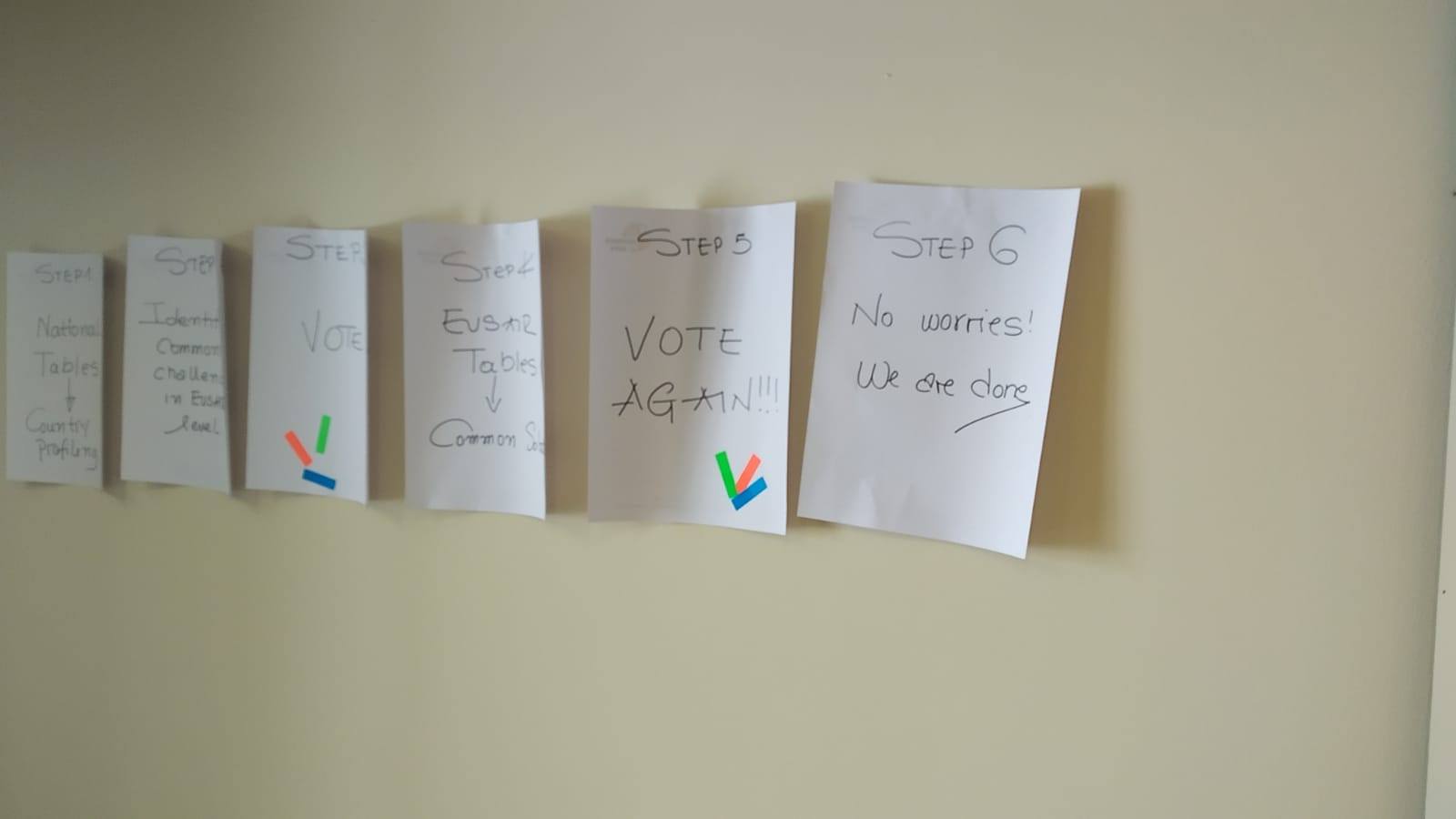
The participants identified as priorities for improving the environment and enhancing women’s entrepreneurship the creation of smart social structures at the local level, as well as increasing the financial resources and simplifying the access process. Furthermore, there was a need for appropriate studies at local and sector level in order to create more specialized education and training programs and the need to create more macroregional network to enable the exchange of knowledge and expertise. (see the Workshop results attached).
The second part of the second day of the Congress was devoted to the exchange of experiences and best practices between female entrepreneurs form the AI region:
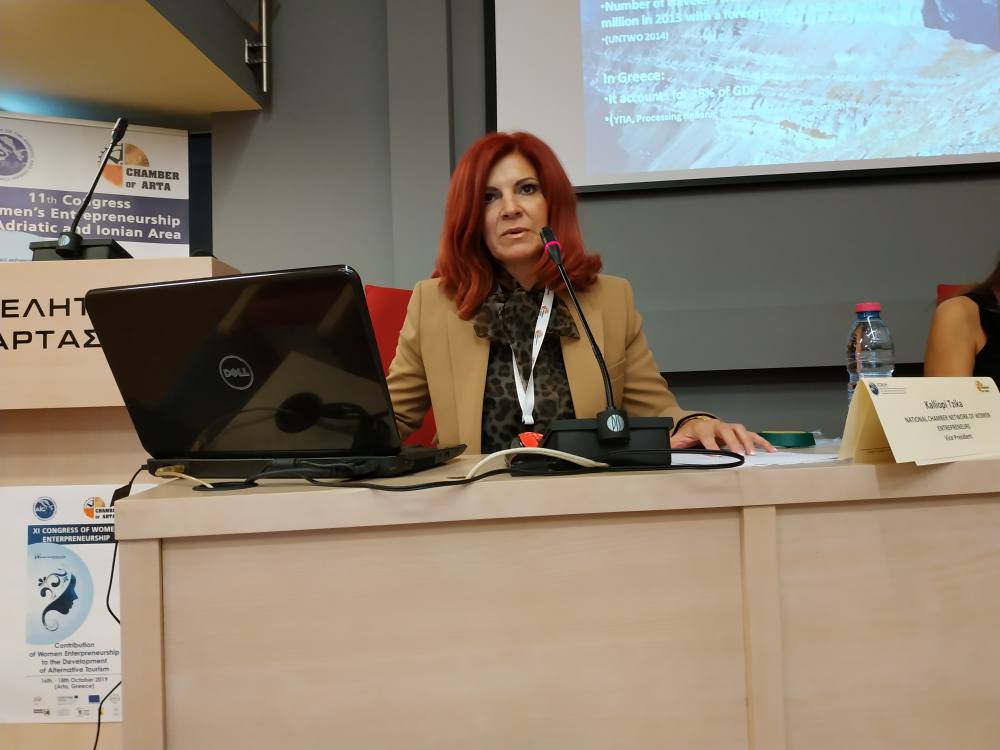 From Greece, the Vice President of the National Chamber of Commerce of Greek Women Entrepreneurs and Secretary-General of the Chamber of Larissa Mrs. Kalliopi Tzika, after referring to the offer of women to the country’s economic well-being and the opportunities that are opened by the exploitation of the forces and in Business, presented the study by the University of Thessaly on development opportunities and alternative tourism sectors in Thessaly. At the same time, she presented examples of good practices from Germany, a country that is a target group for the region and the country, since German tourists are the first to arrive in Greece.
From Greece, the Vice President of the National Chamber of Commerce of Greek Women Entrepreneurs and Secretary-General of the Chamber of Larissa Mrs. Kalliopi Tzika, after referring to the offer of women to the country’s economic well-being and the opportunities that are opened by the exploitation of the forces and in Business, presented the study by the University of Thessaly on development opportunities and alternative tourism sectors in Thessaly. At the same time, she presented examples of good practices from Germany, a country that is a target group for the region and the country, since German tourists are the first to arrive in Greece.
Dimitris Papageorgiou – Entrepreneur of Trekking Ellas Tzoumerka took the floor and presented the best practices of alternative tourism in Epirus and Greece.
Nikolina Farcic from Croatia – the owner of a wedding organization company, cited alternative tourism in Croatia as a good practice of “Destination weddings in Dubrovnik”, surprising the delegates by tossing a wedding bouquet of roses.
Vice President of the Copa Cogeca Women’s Committee, Coldiretti Representative Donna Impresa Marche, CEO of Le Noci Azienda Agricola Ms. Francesca Gironi from Italy spoke about women’s entrepreneurship in agriculture with the aim of developing sustainable tourism at European and Italian levels.
The Secretary-General of the Association of Owners of Hostels and Apartments “Arachthos” Ms. Maria Papavassiliou referred to alternative tourism activities as a key factor in the development of tourism in Arta , presenting as a development model for the Arta Prefecture such as guided tours and Monopia in Broom, the “Chestnut Road” in Pistiana and the “Lefka Path” in Rodavgi.
Finally, Sabina Ramović, owner of the RAMS travel office in Montenegro, supported the need for the local population, stakeholder communities, government and NGOs to work together to develop the region and sustainable tourism. Travel Agency Rams have managed, in a substantial degree, to arise a conscience of a local population about the importance of inclusion in the development of tourism through direct contact of tourists with local people, where the tourists have the opportunity to buy local products and to influence on rising of the life standard for local people.
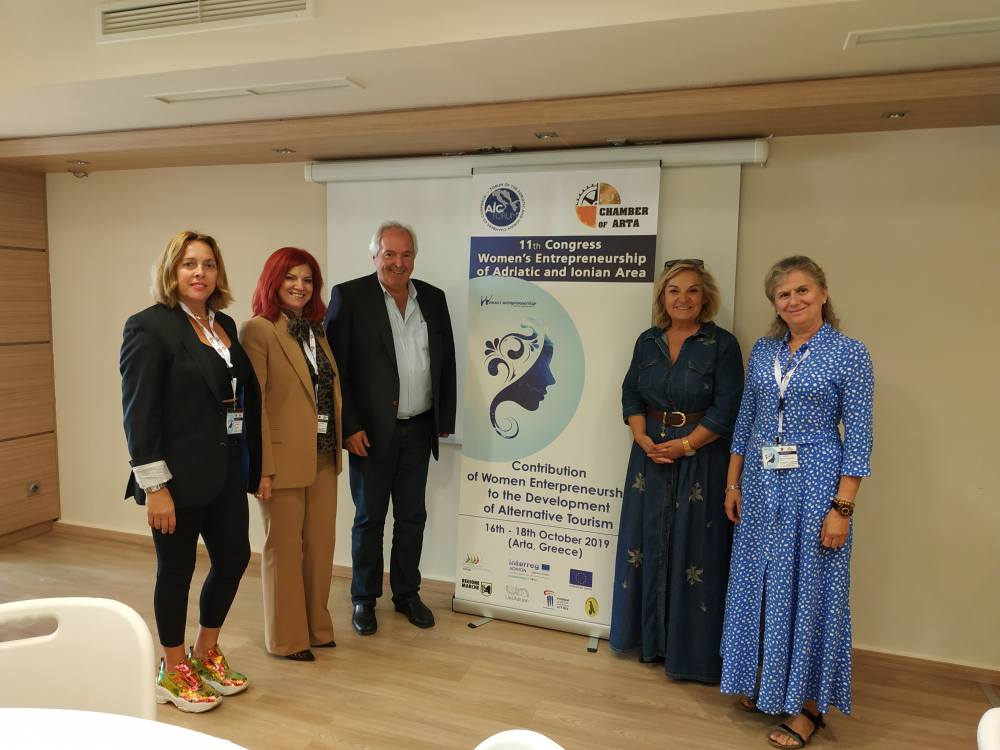
Immediately thereafter, the two-day event ended with a tour of the Archaeological Museum of Arta by archaeologist Ms. Maria Niaru followed with a simultaneous translation into three languages. The guests of the Congress traveled to Ancient Ambrakia, got acquainted with the customs and homes of the Ambracians and were impressed by all the excavation findings
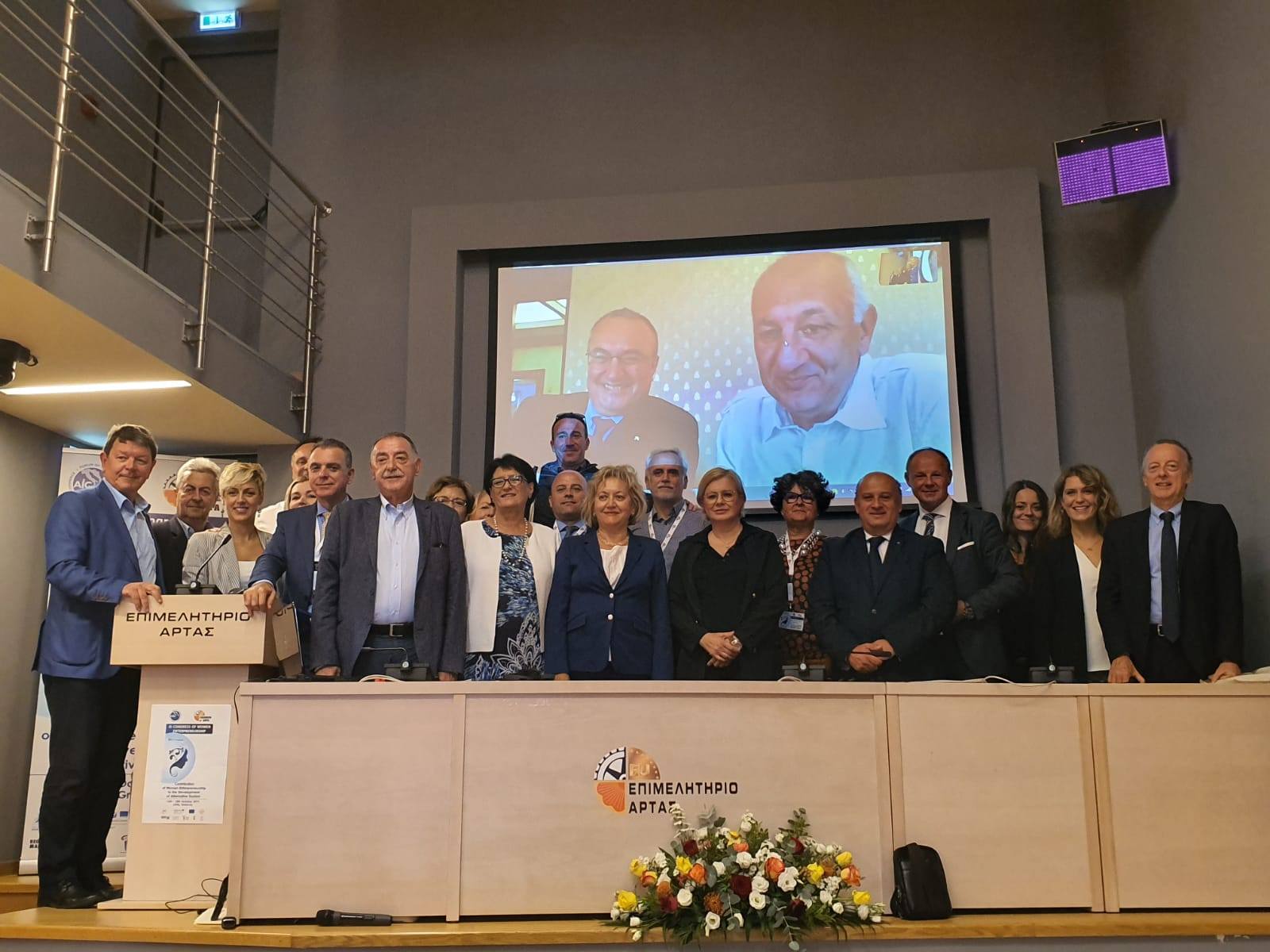
On the 18th of October, The Forum AIC Extraordinary General Meeting took place. Great success has been achieved with the Charter amendments which allow the admission of Serbia as an ordinary member of the Association. Moreover, a new article on the three Vice-Presidents was added. Panagiotis Tsichritzis – Aetoloakarnania Chamber of Commerce, Marko Santic (Vicar) – Chamber of the Federation f the Bosnia-Herzegovina and Joze Tomas – Chamber of Split Chamber of Economy, were unanimously elected for the two-years period 2019-2021. President Sabatini is ready to keep working on Forum Activities with the 3 Vice Presidents and all the other members.
In parallel with the Forum AIC General Meetings, a poster session coordinated by Professor Jenny Pagge from Ioannina University was running, during which projects, best practices, case studies were presented.
PRESENTATIONS:
Andrea Mosconi_Statistical overview
Jenny Pagge presentation
Goletsis YESS_presentation
Donatella Romozzi_EUSAIR Facility Point presentation
Triantafyllos- Universities in Smart Specialisation
Assimakopoulos presentation
Flavia Coccia presentation
Cristina Lambiase presentation
Workshop results
Kaliopi Tzika presentation
Trekking Παπαγεωργίου
Nikolina Farcic presentation
Sabina Ramovic presentation
ΣΥΝΕΔΡΙΟ presentation
Thessaly Handcrafted (video)
